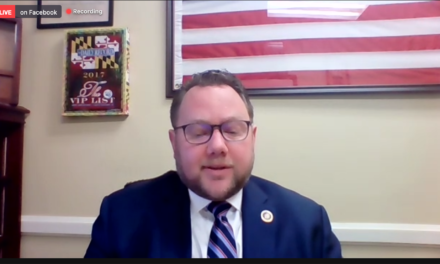UPDATE: Gov. Larry Hogan allowed the bills mentioned in this story to become law without his signature.
By Glynis Kazanjian
For MarylandReporter.com
Controversial legislation spearheaded by Montgomery County lawmakers met resistance Thursday on the Senate floor as Republican lawmakers delayed votes by requesting more time to research the bills — fairly routine motions by the outnumbered minority that gives them some leverage over legislation they oppose.
Giving unions names of new hires
Sen. Robert Cassilly, R-Harford, and Sen. Stephen Hershey, R-Eastern Shore, took on collective bargaining bills sponsored by Sen. Rich Madaleno, Dels. Eric Luedtke and Marc Korman, all Montgomery Democrats.
The bills would eliminate the right of a new state employee to opt-out of being contacted by a labor union representative within 30 days of being hired.
SB677, sponsored by Madaleno, and its House companion bill HB1017, sponsored by Korman, would require officials from all state agencies and state universities and colleges to provide contact information of all new employees to collective bargaining units for the purposes of contacting the new hires within 30 days.
SB819, also sponsored by Madaleno, and its House companion bill, HB811, sponsored by Luedtke, would require the same contact information from all Maryland public school employers.
The bills would require the employer to provide employee contact information including the employee’s name, position classification, home and work address, home and work telephone numbers, personal cell phone number and work and personal email address.
Cassilly questioned how the personal information of the employees could be protected once it was handed over to “3rd party” organizations.
The Senate floor leader, Sen. Thomas “Mac” Middleton, D-Charles, said the information must be kept confidential. “It’s prohibited by law” to share it, Middleton said.
Middleton said the purpose of the address was really only for mailers and that the home addresses are really only used during election years.
Sen. Gail Bates, R-Carroll and Howard, asked if there was anything in the law that prohibited union representatives from visiting the new employees at home.
“It’s happened before,” Bates said. “It’s a strong-arm tactic. . . . It’s an intimidation factor.”
But Bates was told under current law unions are permitted to visit an employee’s home.
Hershey pressed the issue of personal email information being given out.
An amendment to exclude personal email addresses from the required contact information will be voted on when the bill comes up Friday.
A staff member from Madaleno’s office said under current state law, collective bargaining representatives are required to reach out to new state employees whether they pay union dues or not.
Ban on conversion therapy
Sen. Bryan Simonaire, R-Anne Arundel, said Madaleno’s bill to prohibit conversion therapy for minors in the state was filed late and that constituent concerns “back home” have gone unmet.
Madaleno’s bill, SB1028, bars mental health and child care practitioners, as well as counselors, from practicing conversion therapy with minors. The bill would also penalize practitioners for “unprofessional conduct,” make them subject to disciplinary action and defines conversion therapy as a treatment to change an individual’s sexual orientation or gender identity. State funds and grants would also be prohibited in use of conversion therapy practice.
Madaleno objected to Simonaire’s request to delay debate on the bill until the following day, but Senate President Mike Miller overruled him.
“We try to work with everybody,” Miller said to Madaleno. “We have 47 people with different opinions.”
The bill was special ordered until Monday, March 26.
Same day voter registration
Senate Minority Leader J.B. Jennings, R-Baltimore and Harford, challenged identification requirements for a bill sponsored by Del. Kirill Reznick, D-Montgomery, HB532, that would place a constitutional amendment on the November ballot asking voters to pass same day voter registration on Election day.
Residents would be automatically placed on active voting rolls using MVA records from driver’s licenses and state-issued identification cards. Verification of home address and signing a legally binding statement confirming the voter’s eligibility would be required, according to state election officials.
Voters must first approve the constitutional amendment before implementing legislation is passed, which wouldn’t be until 2019,
The bill was special ordered until Friday.





Recent Comments